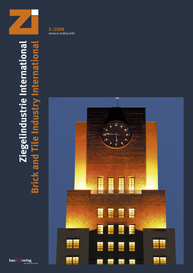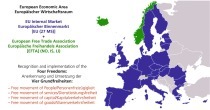Newsletter
14–15 May, Milan
2009 CEN Construction Sector Network Conference
Following the successful 2007 and 2008 Construction Sector Network conferences in Rotterdam and Brussels, CEN has decided to bring together the players of the European industry to develop a road-map for the strategic needs for standardization in the construction industry.
In 2008 “sustainability” was at the centre of the Euro-pean Commission (EC) Lead Market Initiative. The CEN response was to start a strategic review of its standards portfolio to improve the contribution to sustainability. At the same time the EC put forward a proposal for a Construction Product Regulation (CPR) to the European Parliament as a replacement for the Construction Product Directive (CPD).
The conference programme includes break-out sessions on the following topics mechanical resistance and stability; safety in case of fire; health, hygiene and the environment; safety in use; protection against noise; energy economy and heat retention and sustainable use of natural resources.
There are a limited number of places available and to register you should write to Mr Amilcar Da Costa, CEN Programme Manager (amilcar.dacosta@cen.eu).
EU Environmental priorities & liabilities
In January, the European Environment Agency (EEA) published a report on the priority issues that are expected to dominate the EU environmental policy debate this year. As expected, these priority dossiers include climate change, biodiversity, air quality and natural resource. In the report, the EEA called on Member States (MS) to submit more detailed information to the European Commission (EC) on the implementation of EU legislation to improve environmental impact assessments and help shape future EU policy.
One such policy which is causing some problems is the implementation of the 2004 Environmental Liability Directive (ELD). The ELD is the Directive that applies the famous “polluter pays” principle but as national liability regimes vary from MS to MS major differences have appeared. The result is uneven implementation across the EU. Some MS require companies to provide mandatory financial security while others have gone beyond the Directive minimum requirements by including habitats and species not covered by the EU’s Natura 2000 network. Of course, the EC has not looked into how these different implementations have impacted on the competitiveness of industry.
So far the EC has taken seven MS to the European Court of Justice (ECJ) and France and Finland have already been condemned for their delay in implementing the ELD. Experts have predicted further difficulties in establishing legal liability on the part of companies, particularly in cases involving several operators. The current financial crisis will not help industry in securing the financial guarantees required in some parts of the EU.
EC VAT rules on invoicing review proposal
At the end of January, the European Commission (EC) adopted a proposal to change the VAT Directive (2006/112/EC) in respect to the invoicing rules, based on a Communication on the technological developments in the field of electronic invoicing.
The EC aims to increase the use of electronic invoicing, to reduce the administrative burden on business and help Member States to tackle fraud. The EC says that its proposal will simplify, modernize and harmonize the current VAT invoicing rules.
One point that merits your attention is the clear objective to eliminate the barriers to electronic invoicing in the VAT Directive by treating paper and electronic invoices equally. This will come to a surprise for those of you who follow the developments of the Construction Product Regulation (CPR), where the EC is strongly opposing this equal treatment of paper and electronic tool for CE marking.
As the proposal is a key element of the EC Action Programme to reduce burdens on business by 25% by 2012, it not only addresses the VAT obstacles which hamper the up-take of electronic invoicing but also addresses difficulties that businesses face in respect to issuing and storing (especially electronically storing) of invoices, as well as discrepancies of the content of invoices.
The EC wants to remove the preconditions of advanced electronic signatures or Electric Data Interchange (EDI) for sending invoices electronically.
› Questions and answers on technical issues:
http://ec.europa.eu/taxation_customs/taxation/vat/traders/invoicing_rules/index_en.htm
› Further information:
http://ec.europa.eu/taxation_customs/taxation/vat/key_documents/communications/index_en.htm
› Proposal for a Directive:
http://ec.europa.eu/taxation_customs/taxation/vat/key_documents/legislation_proposed/index_en.htm
Tiles & Bricks Europe – TBE A.I.S.B.L.
Rue de la Montagne 17 I 1000 Brussels I Belgium
T + 32 25 11 30 12 I F + 32 25 11 51 74
sykes@cerameunie.eu I www.tiles-bricks.eu





